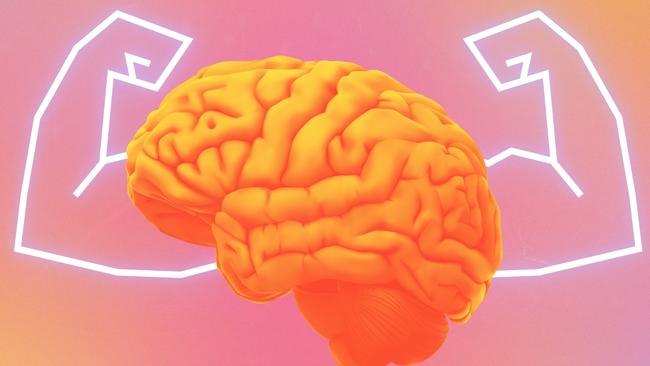Exercise smarter! It will increase your brainpower
New research shows that jogging, yoga and dancing in the kitchen can bulk up your grey matter, boost your mood and slow age-related decline.

Muscle gains, fat loss and improved fitness are the reasons most of us try to stick to some sort of exercise regimen, but several new studies underpin just how important physical activity is for our brain health too. Researchers have recently added more weight to evidence showing that, in addition to producing the well-known exercise high and boosting mood, selecting the right type of workout can build a bigger brain that is better able to resist age-related cognitive decline.
In the first of three newly published papers investigating how exercise remodels brains and minds, a team from the University of Limerick and Iowa State University looked at whether resistance exercise, such as body weight exercises, affects mood. Low-intensity aerobic exercise such as jogging, swimming and cycling has long been known to produce a cascade of chemicals that result in the so-called “runner’s high” for some people. Over time this has been shown to release proteins called neurotrophic growth factors, which encourage nerve cell growth in the hippocampus, the part of the brain that regulates emotions. This results in more connections, better brain function and improved mood.
Strength training is known to have important effects on physical health by boosting bone density and preserving muscles as we age, but whether it enhances mental wellbeing in the same way as running and power walking was less well known. After trawling through previously published meta-analyses and review papers for their study in the journal Trends in Molecular Medicine, Jacob Meyer, associate professor and director of the wellbeing and exercise laboratory at Iowa State, and his colleagues concluded that resistance training at least twice a week, in line with World Health Organisation guidelines, brings “large and consistent benefits”. These can be as effective as many existing available therapies, including some drugs, for mild or moderate depression.

“For anxiety the benefits are somewhat smaller in magnitude, but resistance training still yields some important symptom relief,” he says.
How pumping iron can lift the mood is likely down to specific neurological and behavioural mechanisms associated with the activity, he adds. “We believe the most promising reasons are the cerebrovascular adaptation, or improvements in brain blood flow in important areas for mood disorders, and alterations in insulin-like growth factor-1 [IGF-1] that occur in response to muscle contractions. And there is also the effect of paced breathing as you lift, which, much like meditation, can improve mental health.”
Yet more evidence that weights should be one of the workouts we do weekly came courtesy of another study, published in the BMJ, from the University of Queensland. Researchers analysed 218 existing papers to see how effective different forms of physical activity - from cycling to aerobics - compared with established treatments for depression including cognitive behavioural therapy.
Dr Michael Noetel, senior lecturer in the school of psychology and the lead author, says he wanted to drill down into the specifics of what might be useful, rather than taking the generalised approach of telling people that any exercise is good for their state of mind.
“We found many types of exercise are as good for treating depression as gold-standard psychological therapies. But, specifically, strength training, walking, jogging, yoga, t’ai chi and mixed aerobic exercises showed benefits as strong as some prescribed treatments, including talking therapies and some antidepressant medication.”
Of the effective exercises, people were most likely to stick with strength training and yoga. Joining a gym, fitness group or yoga studio, and even dragging a friend out with you, were all important factors in stickability.
“When you’re starting out it seems wise to avoid going it alone,” Noetel says. “It’s not just the company and the commitment to meeting someone that are helpful, but given low self-esteem is a symptom of depression it can be hard to set the bar at the right level when you are on your own, making it easier to think you are doing well enough.”
What really made any approach work was a structured programme that pushed people to work harder than usual. Rather than advice to “ease into it” and to “go gently”, Noetel found that the best results came from having a clear, progressive exercise plan that didn’t allow for too much freedom or for opting out when you don’t feel like it. “With depression it’s common to get caught up in thoughts and feelings, making it hard to do the things that matter. When you’re not making progress on things that matter to you, the heavy thoughts and feelings get heavier, making it even harder.”
Exercise can help to break this negative cycle. “It gives the confidence to do hard things and results in physiological changes that help sleep, mood and our brain’s ability to learn new patterns.”
Noetel says that most people given antidepressants would also benefit from well-thought-out exercise.
Intriguingly, how often you exercise each week probably doesn’t matter as much as how much effort you put in when you do it. It needs to be regular, but the higher the intensity of any exercise, the better the results. No getting away from it, you do need to huff, puff and sweat your way through a workout.
“Exercise probably works due to lots of factors combined with running clubs being social and outside in ‘green spaces’, both of which help improve our mood, and things like yoga giving us more space from our thoughts outside our comfort zone,” Noetel says. “But given we found that intense exercise worked better, it seems likely that the activity is also changing the balance of neurotransmitters in the brain, which might make people feel better or help them to lay down new patterns of thinking.”
Although more is better for health, if you can manage only half an hour of regular activity a week it might be enough to bulk up your brain and protect against the effects of ageing, according to the results of a new study in the Journal of Alzheimer’s Disease.
Neurologists from Washington University, the Pacific Neuroscience Institute Brain Health Centre (PBHC) and elsewhere who conducted MRI brain scans on more than 10,000 adults found that those who exercised moderately for a total of 25 minutes a week - one sixth of the 150-minute target set by the World Health Organisation and UK health chiefs - had bigger, healthier brains than those who did no exercise.
Among the physically active, brain volume was greater in both the frontal lobe part of the brain, which is important for decision-making, and the hippocampus, where memories are formed and stored. Volumes of brains’ grey matter, which processes information, and connective white matter were also higher in those who ran, walked, swam or did any other form of exercise. Since age-related brain shrinkage is associated with a higher risk of cognitive decline and dementia, the findings are encouraging. Cyrus A Raji, an associate professor of neurology at Washington University and the lead author, says they show that exercise not only lowers the risk of dementia “but also helps in maintaining brain size, which is crucial as we age”.
According to Noetel, so convincing is the evidence for brain health that most psychologists and neurologists he knows put into practice the results of their findings. He rides his bike home from work “to melt the stress away”, and heads out for a walk with his two young sons when they are fighting to defuse the tension. “Exercise is underrated for cognitive and mental health,” Noetel says. “I think most of us know exercise is good for our body, but we do underestimate how important it is for our brain.”
Workouts to benefit your brain
1. Aim for 4,000 steps a day
Even if you fall short of the popular 10,000 daily steps target, you will still benefit. “We found that even moderate levels of physical activity, such as taking 4,000 steps a day, can have a positive effect on brain health,” says the neuroscientist David Merrell, director of geriatric psychiatry at the PBHC and one of the authors of the study in the Journal of Alzheimer’s Disease.
2. Lift weights twice a week
It’s never too late to start resistance training. Three months of weight training twice a week was enough to produce neurochemical changes and improvements in brain health in one group of adults aged 60-80. The workout for participants in this study, published in GeroScience journal last year, consisted of four lower-body exercises performed for 3 sets of 6-10 repetitions at 70-85 per cent of the maximum they could lift. Make sure you lift weights that are progressively heavier to continue reaping the rewards, Noetel says.
3. Go for a 10-minute jog
Running for just 10 minutes at a moderate intensity improves mood and executive processing in the brain, according to scientists at the University of Tsukuba in Japan. Brain scans carried out after the brief bout of running showed the activity increased local blood flow to the prefrontal cortex of the brain, which plays a role in executive functions and mood control. Other researchers have suggested the rhythmic motion of running helps to regulate serotonin receptors in the prefrontal cortex, boosting mood and cognitive control.
4. Dance in the kitchen
In his review Noetel found only five studies related to the impact of dance on depression but that outcomes were encouraging, possibly because of the added mood-enhancing boost from music. His advice? Put on some tunes and dance in the kitchen. “The dance studies had the strongest effects of any we looked at,” he says. “So while we can’t be as confident in the effects of dance alleviating depression because of the lack of research on it, it does look like a fantastic option for those willing to try it.”





To join the conversation, please log in. Don't have an account? Register
Join the conversation, you are commenting as Logout